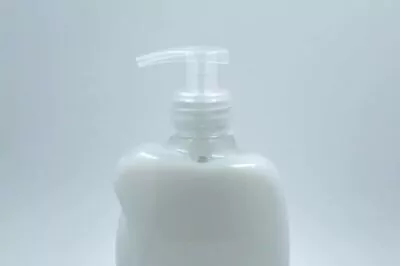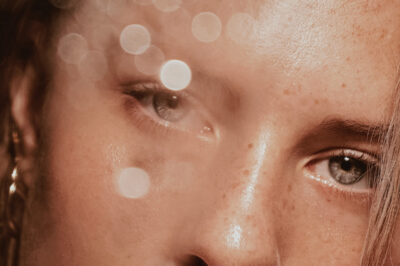Table of Contents[Hide][Show]
Polysorbate 20 is an ingredient commonly found in many skin care and cosmetic products, serving as an emulsifier to blend oils and water. However, there is increasing concern from consumers about the safety and effects of this synthetic ingredient as more people grow wary of chemical additives in their beauty routines.
Take a look at the ingredient list on your facial cleanser, body wash, toner, or moisturizer, and see if you find polysorbate 20 in your skin care products. If you do, you may want to shop for something better next time—particularly if your child uses the product, too.
In this article, we will examine the chemical composition of polysorbate 20, how it is produced, and research on its possible health impacts. We’ll also provide suggestions for natural alternatives, so you can avoid polysorbate 20 and feel confident about the ingredients you put on your skin.
What is Polysorbate 20 in Skin Care?
Polysorbate 20 is a synthetic compound widely used in skincare and cosmetic products. It functions primarily as an emulsifier and surfactant, helping to blend oil and water-based ingredients into stable, uniform formulations. This oily liquid is derived from the reaction of sorbitol (from plant sources like corn or wheat) with lauric acid (commonly from coconut or palm oil) and ethylene oxide (flammable, colorless gas with a sweet odor that is used to make other chemicals and as a sterilizing agent).
Polysorbate 20 is found in a wide range of skincare items, including cleansers, creams, lotions, serums, and sunscreens. Key characteristics of Polysorbate 20 in skincare:
- Emulsification: With an HLB value of 16.7, Polysorbate 20 excels at creating oil-in-water emulsions, preventing separation in creams, lotions, and serums.
- Solubilization: It helps dissolve and distribute active ingredients, essential oils, and fragrances evenly throughout products.
- Texture enhancement: Polysorbate 20 improves the feel and consistency of formulations, making them more pleasant to apply.
- Mild cleansing: Acts as a gentle cleansing agent in facial cleansers and shampoos.
- Stability: Allows cosmetic products to have a longer shelf life–which is particularly helpful when products are produced in large batches to save on costs. .
In its original form, polysorbate is a harmless sorbitol, which is a sugar alcohol. To make polysorbate 20, however, the sorbitol undergoes a process called ethoxylation. This involves reacting the sorbitol with ethylene oxide, which results in the synthesized ingredient we know as polysorbate 20.
The number 20 in the name refers to the fact that the sorbitol has been ethoxylated with 20 units of ethylene oxide. The more ethylene oxide units added, the lower the viscosity and enhanced emulsification ability.
Polysorbate Family: Polysorbate 20 vs Polysorbate 80
Polysorbate 40, Polysorbate 60, and Polysorbate 80 are other common members of the Polysorbate family, sharing many characteristics with Polysorbate 20. Each variant differs primarily in the number of ethylene oxide units attached to their molecular structure, which influences their solubility and emulsifying properties. Polysorbate 20 and Polysorbate 80 are the most widely used in skincare formulations. Let’s explore the differences between polysorbate 20 and polysorbate 80:
| Property | Polysorbate 20 | Polysorbate 80 |
| Chemical Name | Polyoxyethylene (20) sorbitan monolaurate | Polyoxyethylene (20) sorbitan monooleate |
| CAS Number | 9005-64-5 | 9005-65-6 |
| HLB Value | Approximately 16.7 | Approximately 15 |
| Source | Derived from sorbitol and lauric acid | Derived from sorbitol and oleic acid |
| Appearance | Pale yellow to yellow liquid | Amber-colored, viscous liquid |
| Solubility | Soluble in water and ethanol; partially soluble in oils | Soluble in water and ethanol; more soluble in oils compared to Polysorbate 20 |
| Common Applications | Ideal for formulations with a higher water content (less than 5% oil): Facial cleansers, serums, mists | Effective in emulsifying more complex oil mixtures: Creams, lotions, ice cream |
Polysorbate 20 is known for its higher hydrophilicity, attributed to its greater number of hydrophilic groups (polyoxyethylene). This makes it an effective oil-in-water (O/W) emulsifier and solubilizer, particularly useful in formulations that require the incorporation of essential oils or fragrances. It is often used in lighter products like facial cleansers and serums, where only a small amount of oil is present—typically less than 5%.
Polysorbate 80 is one of the most widely utilized polysorbates due to its versatility. It also functions as an O/W emulsifier but is particularly effective in products with a higher oil content. With significant resistance to electrolytes and strong hydrophilicity, Polysorbate 80 can stabilize liquid, semisolid, and solid formulations. It is commonly found in richer creams, lotions, and cleansing oils where it helps blend oils and water effectively. However, it is worth noting that Polysorbate 80 can impart a darker hue to formulations compared to Polysorbate 20, which may affect the aesthetic appearance of the product.
Regulatory Status of Polysorbate 20 in Skincare
Polysorbate 20 is a widely used emulsifier in skincare and cosmetic products, but its safety has been scrutinized by various regulatory bodies and researchers.
FDA Approval
The U.S. Food and Drug Administration (FDA) permits Polysorbate 20 as a food additive and an indirect food substance, allowing its use as an emulsifier. However, the FDA does not specifically approve cosmetic ingredients, which raises questions about the oversight of its safety in topical applications.
Cosmetic Ingredient Review (CIR) Assessment
The CIR Expert Panel has evaluated Polysorbate 20 and deemed it safe for use in cosmetics when formulated to be non-irritating. However, this assessment is based on available scientific data, which may not fully account for long-term exposure or the cumulative effects of using multiple products containing this ingredient. I’d briefly like to mention that the Cosmetic Ingredient Review (CIR) is funded by the Personal Care Products Council (PCPC), whose board members include CEO and president of Unilever, CEO and president of L’oreal USA, president of Johnson & Johnson’s consumer health division and the general manager of fragrance and beauty at CHANEL.
Environmental Working Group
EWG has raised concerns about Polysorbate 20, particularly regarding its inhalable forms, which may pose respiratory risks. They highlight potential contamination from toxic impurities, emphasizing that while Polysorbate 20 is generally considered safe for cosmetic use, its safety can diminish if not properly formulated or concentrated. The EWG advises caution with inhalable products containing this ingredient due to possible irritation and harmful effects if inhaled or absorbed through the skin.
Animal Studies
Animal studies have reported mixed results regarding the safety of Polysorbate 20:
- A Magnusson-Kligman guinea pig maximization test showed moderate to strong skin sensitization to Polysorbate 20 in some subjects, indicating potential allergic reactions.
- In studies where high concentrations were administered, adverse effects such as inflammation and cellular damage were observed (Polysorbates, 1984).
Safety Concerns and Potential Risks: Why is Polysorbate 20 Bad for Your Skin?
While polysorbate 20 serves essential functions in cosmetic formulations as an emulsifier and surfactant, concerns surrounding its contamination with 1,4-dioxane and potential for causing skin irritation or allergic reactions cannot be overlooked. The cumulative exposure from multiple daily products poses additional risks, particularly for vulnerable populations such as children. Users should remain vigilant about ingredient labels and consider alternatives even if they have not yet started experiencing adverse effects.
Contaminated with 1,4-Dioxane
One of the major concerns regarding polysorbate 20 is its contamination with 1,4-dioxane, a byproduct of the ethoxylation process used in its production. The U.S. Environmental Protection Agency (EPA) classifies 1,4-dioxane as a known carcinogen. Independent studies have detected this compound in various personal care products, raising alarms about chronic exposure.
- Skin Penetration: Research indicates that 1,4-dioxane readily penetrates human skin. According to the Cosmetic Ingredient Review (CIR), levels found in some products are 1,000 times higher than those deemed safe in animal studies.
- Cumulative Exposure: Regular use of multiple products can lead to significant cumulative exposure over time. The Organic Consumers Association notes that many natural personal care products contain residues of 1,4-dioxane, raising alarms about chronic exposure.
There is so much concern about this contaminant that a class-action lawsuit was filed in New Jersey against manufacturers of children’s bath and personal-care products. Defendants manufactured, distributed, marketed, or sold products containing formaldehyde and 1,4-dioxane.
Skin Irritation and Allergic Reactions
Polysorbate 20 has been associated with skin irritation and allergic reactions. While extensive clinical studies suggest a low potential for human skin irritation, isolated cases have been reported.
A comprehensive safety assessment conducted by the CIR concluded that polysorbate 20 is safe for use in cosmetics when formulated to avoid irritation. However, it noted that excessive doses can induce mild temporary irritation.
Some animal studies of PLOS One have shown moderate to strong skin sensitization under specific conditions.
In addition, AAAIAI has reported hypersensitivity reactions linked to the use of polysorbate-containing products. Dr. Eric Macy in AAAIAI study notes that “immediate-type hypersensitivity to all polysorbates can be skin tested for using the same dilutions,” indicating that while reactions are rare, they can occur and warrant caution in sensitive individuals.
Cumulative Exposure Concerns
The mechanism by which polysorbate 20 enhances skin absorption involves altering the skin’s barrier properties. It interacts with lipid membranes, leading to increased permeability and allowing other compounds to penetrate more effectively 1. This property can be beneficial for drug delivery but raises concerns about unintended absorption of harmful substances.
And according to the FDA, “Skin absorption studies demonstrated that dioxane readily penetrates animal and human skin from various types of vehicles.”
This can be especially concerning if you’re taking a hot bath or shower. As your pores open up, your skin could be taking in even more of the 1,4-dioxane in the product.
Other Polysorbate 20 Toxicity Concerns
In addition to the risks of 1,4-dioxane contamination, polysorbate 20 itself may also have concerning toxicity effects:
- Research suggests that polysorbate 20 may disrupt hormone function and reproduction by interfering with the endocrine system. A review by the Food Standards Australia New Zealand indicates that while polysorbate 20 is generally recognized as safe, some studies have raised concerns about its potential endocrine-disrupting properties, particularly in animal models.
- Safety data sheets classify polysorbate 20 as an irritant to mucous membranes. This classification is consistent with findings from various chemical hazard assessments, which confirm that exposure can lead to irritation.
- Upper respiratory irritation has been documented in occupational settings where polysorbate 20 is used. Precautions are recommended for workers to avoid inhalation, especially when dealing with aerosolized forms of the substance.
- Inhalation of polysorbate 20 can lead to respiratory symptoms such as coughing, wheezing, and chest tightness. Reports indicate that these symptoms are particularly relevant in occupational settings where aerosolized products are common.
- Polysorbate 20 may exacerbate fungal acne (malassezia folliculitis), an inflammatory skin condition linked to yeast overgrowth. Its structure resembles lipids that malassezia can utilize as a food source, suggesting a potential risk for individuals prone to this condition.
How to Identify Polysorbate 20 in Skincare products
This ingredient is frequently found in a variety of skincare products such as moisturizers, facial cleansers, body washes, and toners. Look for “Polysorbate 20” listed among the ingredients on product labels. It may also appear under its synonym “Tween 20”.
While it is most commonly labeled as “Polysorbate 20,” it may also appear under different names or abbreviations, such as:
- Polyoxyethylene (20) sorbitan monolaurate: This is the full chemical name for Polysorbate 20.
- E432: This is its E number designation, which may appear in some formulations.
- Sorbitan laurate: This can sometimes be listed alongside Polysorbate 20 but refers to a different compound
Natural Alternatives to Polysorbate 20
If you were exposed to this ingredient only once in a while, you would have a lot less to be concerned with. The problem is that most of us use 10 or more products a day, several times a day, every day.
If even a couple of those have polysorbate-20, the exposure could be adding up, especially if it’s penetrating the skin. And the concern is even greater for young children.
Natural Substitutes for Polysorbate 20
To avoid this ingredient, just read the ingredient lists on labels. It’s easy enough to find. Better yet, prioritize shopping at whole foods stores, organic shops, and online stores that offer natural and nourishing alternatives.
For Natural Emulsifiers
The good news is there are natural alternatives to polysorbate 20 that avoid the risks and provide effective emulsification.
Here are some options:
- Beeswax: Made by bees to hold honeycomb together, beeswax thickens oils and helps bind them to water naturally. It also conditions the skin, making it a popular choice in balms and creams.
- Cetearyl alcohol: Derived from coconut or palm oil, cetearyl alcohol acts as an emollient and emulsifier, providing stability and a creamy texture to cosmetics.
- Sorbitan Olivate: Derived from olive oil, Sorbitan Olivate is a moisturizing emulsifying agent that blends water and oil seamlessly, creating stable and luxurious cosmetic formulations.
- Candelilla Wax: Obtained from the candelilla shrub, this wax serves as a natural thickening and stabilizing agent, providing structure to products like lip balms, creams, and lotions.
- Xanthan Gum: A polysaccharide produced through fermentation. A versatile emulsifier and thickener that enhances texture and viscosity in cosmetic formulations.
- Vegetable Glycerin: Derived from plant oils. A natural humectant that attracts and retains moisture, improving the moisturizing properties of cosmetic products such as creams, lotions, and serums.
Several other natural solubilizers can replace Polysorbate 20 effectively:
- Caprylyl/Capryl Glucoside: A nonionic surfactant with excellent solubilizing properties, this ingredient is suitable for transparent aqueous solutions and can help blend oils into water-based formulations effectively.
- Durosoft PG10CY: A COSMOS-approved natural solubilizer that works well for incorporating fragrances and essential oils into various formulations without compromising their integrity.
- Olive Solubilizer (Sodium Olivate): Made from olive fatty acids and glycerin, this solubilizer is ideal for oil-in-water emulsions, offering a gentle touch for sensitive skin.
- Sunflower Solubilizer (Sodium Sunflowerseedate): Derived from sunflower fatty acids, this solubilizer is perfect for mists and cleansers, providing a non-tacky finish while ensuring effective blending of ingredients.
Choosing Polysorbate 20-Free Products
Making informed choices is key to avoiding risky ingredients like polysorbate 20 in your beauty routine. When purchasing cosmetics and skincare:
Build Your Perfect Skin Care Regimen
Take Quiz- Check ingredient lists carefully and avoid purchasing items containing polysorbate 20.
- Look for products from natural, organic brands that you trust and that emphasize safe ingredients.
- Do research on companies and contact them with questions if uncertain about specific ingredients.
- Opt for items where you recognize and understand all ingredients on the label.
You can also visit our online store for products that are free of Polysorbate 20 and safe for you and your family.
Conclusion
Polysorbate 20 is an ubiquitous ingredient in many beauty and skincare products, valued for its emulsification abilities. However, the risks of contaminants like cancer-causing 1,4-dioxane give reason for concern, especially with repeated use over many years.
While some exposure may be harmless, it is wise to exercise caution with ingredients made using harsh chemical processes. Seeking out safer products that use natural emulsifiers, like beeswax and xanthan gum, allows you to avoid potential hazards while still caring gently for your skin.
As shoppers pay more attention to what goes onto and into their bodies, knowing what you are buying becomes critical. Stay curious and don’t feel afraid to question the status quo when it comes to commonly-seen ingredients like polysorbate 20. Opt for products using pure, high-quality, trustworthy ingredients whenever possible.
Your skin is your body’s largest organ–nourish it well by being an educated, selective shopper. Avoiding chemical additives like polysorbate 20 is one way to care both for your health and appearance safely.








THANK YOU SOOOO MUCH!
I just noticed that the Quantum Health product called TheraZinc, which is a throat spray used to treat colds, has polysorbate 20 listed as its second ingredient. I compared the current list of ingredients to an older bottle which I had and found that the Peg-40 castor oil had been replaced by polysorbate 20. I called the Quantum company in Eugene, Oregon and at first was told that polysorbate 20 had always been in the TheraZinc formulation. I corrected the customer service representative and told her it had not, at which point she put me on hold. She came back on the line and told me that this ingredient was added to keep the oils and water in the product from separating. I expressed concern that it was now in the product and furthermore was the second ingredient listed, indicating that there is more a polysorbate 20 in the TheraZinc spray then there are essential oils such as Echinacea, clove and slippery elm bark, among others. Having read online that polysorbate 20 is not only an irritant but a potential carcinogen, I certainly will not be buying TheraZinc spray again. Buyer beware!
I was shocked to learn that this ingredient is also used in tampons. Specifically, Playtex sport.
There are so many blogs warning against polysorbate-20 but have yet to find one that offer any advice for alternatives which can be really frustrating.
From the info I’ve gathered over the last few days, here’s a list of potential (unverified) alternatives to polysorbate-20 – none of which I’ve tried (yet):
1. Coco Glucoside
2. Cetearyl Glucoside
3. Decyl Glucoside
4. Laurel Glucoside
5. Caprylyl/Capryl Glucoside
6. Potassium Cocoate
7. Sulfated Castor Oil (Turkey-Red Oil)
8. Glyceryl Oleate
Has anyone had any experience with these?
I agree with Liz.
Please do your research in context and refrain from isolating information. It doesn’t present a fair and comprehensive perspective.
I refer to the report by FDA regarding 1,4 dioxane in cosmetics.
http://www.fda.gov/cosmetics/productsingredients/potentialcontaminants/ucm101566.htm
The report is self-explanatory and conclusive.
You can do all the research you want. But historically the government has declared that a certain number of parts per million of this that or the other compound were safe to use, only to be refuted by later studies based on cancer clusters. NO AMOUNT OF A KNOWN CARCINOGEN CAN BE PROVEN TO BE SAFE. By the time they have been proven NOT to be safe, enormous damage has already occurred. There is no such thing as a “comprehensive” report on the safety of 1,4- Dioxane at any concentration. At best there are time-limited studies at specified concentrations wherein no detectable damage had occurred by the end of the study period. If that reassures you, have at it. Remember that 1,4-Dioxane is a BY-PRODUCT which occurs during the manufacturing processes; no one puts it there intentionally. But I don’t see assays of the compound in the products manufactured with Polysorbate 20. So who the hell knows? Avoid!
What is “moderation”?
@gynomiteful Amen! People still put all their trust in these governmental organisations. Even though most studies are still being done by the manufacturers and only checked by these organisations like the FDA or which ever. Like asbestos and glyphosate have also been approved as safe in the past. I think we already know better by now.
Hi,
Im trying some DYI home and body tutorials off a Pure natural company who sells this Polysorbate 20 ingredient.
Can you advise if the following ingredients combined with the Polysorbate 20 ingredient will be harmful?:
100ml Mist glass spray bottle
20ml Witch Hazel Extract
2ml Fragrance or Essential Oil of your choice
10ml Polysorbate 20
Distilled water to fill
I think you suggest that the ingredient is ok to use (not harmful)…. but may be harmful if combined with other potential ingredients in the product?
Thanks
We don’t suggest using this ingredient and we don’t use it in our skin care at all.
I purchased and used Banana Boat Aloe Vera spray gel which contains Polysorbate 20. This morning I woke up with a rash. Small blister type bumps all over my back, chest and stomach area. My husband applied this to my back after I was in the sun for about 30 minutes.
This urged me to look up the ingredients to see if there was anything that I could have caused me an allergic reaction.
I am not, to my knowledge allergic to many things, especially lotions, etc..
After reading this article, I have now become more aware of what I am suing and putting on my body.
Great article, thanks for the knowledge!
I have a very bad reaction to coconut and any of its derivatives – especially the cocamides. I ordered a kid’s shampoo that promised not to have anything like that in it but I notice today, the fourth ingredients is Polysorbate 20.
I’m pretty sure I read somewhere that this is derived from coconut. Do you know?
I’m putting off giving it ‘a go’ because my reaction can be really ghastly.
Hi Sally,
We’re not sure what the source of the Polysorbate 20 is in the shampoo you bought. We would suggest emailing the company and asking because it’s possible that this ingredient can be derived from many different things.
What is a good replacement to emulsify and combine water and oil?
What is a good replacement to emulsify and combine water and oil?–
Yes, that is what exactly what i’ve been searching. Most of them gave negative input of this polysorbate-20 and EG-40 Hydrogenated Castor Oil, but none have given the “organic and natural” replacement for this. Pls help. Pls.
This is exactly what I want to know and nobody seems to be able to answer! And this is wat led me to this site: what do I replace polysorbate with??
Polysorbate 20 is used in some pet products. Sorbitol is toxic to dogs. Please read the labels on your pets’ skin care and shampoo products.
hi!
what i find important with skin care made with organic ingredients is that the ingredients are not tested on animals in an unnecessary or cruel way:
“The Cosmetics Database rates Polysorbate 20 as a low hazard ingredient, noting developmental and reproductive toxicity as concerns, but finding these results only in animals after high doses were administered. Lesser concerns regarding this ingredient are endocrine disruption, organ toxicity, and irritation, and one or more animal studies show skin irritation at moderate doses.”
/maya
it is also used in Twinrix vaccine by Glaxosmithkline
Hi. I find all of this very interesting as I have started making my own natural deodorant which calls for polysorbate 20. Would you mind posting a link to your source of information regarding the lawsuit filed in New Jersey? Also I clicked the link to view your fact sheet & received an error that it was invalid. Valid links to your sources, as well as links to the websites of organizations such as The Organic Consumers Organization & Campaign for Safe Cosmetics, would greatly help me see the validity in your statements. I’m curious about polysorbate 20, but I don’t want to be mislead. Thanks so much for your time!
Hi Meredith! Thanks for reading and commenting. I updated that link, so it should work now. 🙂
Hi, You can find the Campaign for Safe Cosmetics here: http://www.safecosmetics.org/
Yes, Jay and Marcus, not only does she vilify a perfectly safe ingredient, according to listed ingredients on this site, she also sells rosemary hydrosol with zero preservatives. I can only imagine what folks are spraying on their faces after that has been around awhile. Talk about unsafe. A $30 yeast and bacteria cocktail.
Hi there! Thanks for reading and commenting. Don’t worry, our toning mists are perfectly safe. Rosemary is actually a natural antimicrobial, but yes, their shelf life is shorter than a product that has synthetic preservatives in it.
Rosemary extract is an antioxidant not an antimicrobial preservative.
I live n the EU where it would be illegal to sell your product due to health risks from bacteria, yeasts and moulds which thrive in hydrous products.
Hydrosols don’t need preservatives.
Valerie, have you considered using coconut oil as an alternative?
I have a recipe for making a liquid dish soap that calls for 15% polysorbate 20 and would like to know if you can recommend an alternative I could try in my formulation? I am looking everywhere for advice and can not find anything. I realize that you make and sell products but I hope you can share this information with me! Thank you!
Wow, again another misinformed piece of information for the sole purpose of promoting ones own brand. The truth is that not every single blend of poly sorbate 20 is “contaminated” with 1-4 dioxane. I am sure you can find some cheaper raw material blends which have trace amounts, but in general the majority of producers have eliminated it.
So you say you are polysorbate free? What emulsifiers are you using instead? Have you done 1-4 dioxane tests on your own products!
I sincerely hope consumers do a bit more research before vilifying a perfectly safe ingredient thar has been used for decades with no issue.
Hi Markus! We are polysorbate-20 free. There are lots of natural options for emulsifying products! We use a coconut derived wax, and at times (when we’re unable to obtain a good coconut wax source) we use a Non GMO vegetable wax.
Check out the material safety data sheet for it -look out!
http://www.fishersci.com/ecomm/servlet/msdsproxy?productName=BP337100&productDescription=TWEEN 20 100ML&catNo=BP337-100 &vendorId=VN00033897&storeId=10652
&vendorId=VN00033897&storeId=10652
It is in the NATURAL face paint now I will ever be concealed . : (
Watch out folks….this is the new 21st century marketing angle. Scare consumers away from the competition. I’ve been formulating lotions and cremes going on 30 years. This type of misinformation just keeps piling up. Do your homework and PLEASE DON’T believe everything you read and see online. Thanks
I got a tattoo about 6 months ago and my body wash has been making my tattoo itch. Didn’t think much of it. Then my kid used some of her tattoo markers on me and when she drew on my tattoo it started itching like crazy! I had to wash it off immediately! I looked at the ingredients in both products to see if it had a similar ingredient. I found that the body wash had potassium sorbate in it and the markers had polysorbate 20 in them. I don’t know the ingredients in the tattoo ink but I think something in it may be reacting with the polysorbate. What harm am I causing my body?
I came across e toothpaste (in Italy) called Dietifricio. The Italian word for toothpaste is Dentifricio. It was said to bleach your teeth better than anything else( they all do) and to make you loose your weight! You don’t have to swallow five tubes before breakfast to feel full up. You just do as usual brush and rinse and the aftertaste is so horrible specially if combined with sweet drinks and food that it lasts til the next meal, and stop eating between meals. It is just an other way to get intoxicated, if you haven’t been to the dentist recently. It is when I red the contain list I came across your sympathetic site. Among other chemicals this toothpaste contain polysorbate 20. Which one of the other ingredients causes the disgusting taste isn’t yet on the clean.
The dentists are the real polluters in this world and I, being a dentist since -71 fight against the toxic world of the dentists, amalgam, root canal, heavy metals and fluoridation. Bobbie Beckman, Italy.
Hi, you can use activated charcoal for teeth whitening as well as take it internally to rid your body of toxins. I use coconut activated charcoal rather than from the hardwood which I purchased on Amazon. Don’t let the color intimidate you though!
I arrived at this page while investigating the ingredients in my Whole Foods Citrus Grapefruit Shampoo. It contains polysorbate-20 and Sodium Benzoate (When sodium benzoate combines with ascorbic acid (vitamin C) benzene can form, which is a known carcinogen).
Hi I use a fake tan that has polysorbate 20 as the 2nd ingredient. Iv been using it since 2010 on and off, but recently been using it every 2nd week for a few months now.. I’m starting to become ingredient conscious and this worries me. What do you mean when you say the polysorbate gets contaminate with the 1,4-dioxane? Does this sometimes not happen and I will be safe??
I might search for an organic fake tan asap
The manufacturers are required to test for it by law and they do in fact keep the levels very low. Cosmetic companies lean on manufacturers to keep it even lower. This goes for other common contaminants in cosmetic ingredients as well. There is an anti-anything that does not come directly from nature campaign going on all over the internet right now. If you were doing a campaign such as this where you want people to completely abandon things that are widely used (such as anything that makes foam) would you not overstate the problem? Some unscrupulous biased people will fail to mention problem is being regulated and controlled? Or they use it as a way to dupe people into spending money on their “natural” product. They laugh all the way to the bank. On the other hand. Just like people with allergies to certain things like peanuts or coconuts. It does not affect the majority of the populous. But it is life threatening for a few. They have to know what is in the products they use.
Is there an ingredient that will blend oils as does polysorbate 20?